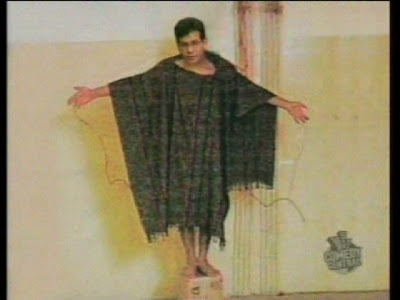Gonzales Secretly Endorsed Severe Interrogations
 Alberto Gonzales approved "an expansive endorsement of the harshest interrogation techniques ever used by the Central Intelligence Agency" and he did so in secret and he did so over the objections of James B. Comey, the deputy attorney general.
Alberto Gonzales approved "an expansive endorsement of the harshest interrogation techniques ever used by the Central Intelligence Agency" and he did so in secret and he did so over the objections of James B. Comey, the deputy attorney general.
Comey was so disgusted with what he viewed as the opinion’s overreaching legal reasoning that he told members of the Department that they would all be "ashamed" when the rest of the world learned of this.
The new opinion, the officials said, for the first time provided explicit authorization to barrage terror suspects with a combination of painful physical and psychological tactics, including head-slapping, simulated drowning and frigid temperatures.
The classified opinions, never previously disclosed, are a hidden legacy of President Bush’s second term and Mr. Gonzales’s tenure at the Justice Department, where he moved quickly to align it with the White House after a 2004 rebellion by staff lawyers that had thrown policies on surveillance and detention into turmoil.
Congress and the Supreme Court have intervened repeatedly in the last two years to impose limits on interrogations, and the administration has responded as a policy matter by dropping the most extreme techniques. But the 2005 Justice Department opinions remain in effect, and their legal conclusions have been confirmed by several more recent memorandums, officials said. They show how the White House has succeeded in preserving the broadest possible legal latitude for harsh tactics.
A White House spokesman, Tony Fratto, said Wednesday that he would not comment on any legal opinion related to interrogations.
This seems a further example of Gonzales's total lack of independence and his almost manic desire to give the White House what it wanted. The US has traditionally criticised country's that used secret detention and coercive interrogation techniques and yet here we have Gonzales endorsing "the harshest interrogation techniques ever used by the Central Intelligence Agency".
Indeed, it can be assumed that Gonzales was only made Attorney General because he was prepared to say things were legal that his predecessors were not.
The debate over how terrorism suspects should be held and questioned began shortly after the Sept. 11, 2001, attacks, when the Bush administration adopted secret detention and coercive interrogation.The Office of Legal Counsel has, according to Douglas W. Kmiec, who headed that office under President Ronald Reagan and the first President George Bush, lost it's ability to say no.
The policies set off bruising internal battles, pitting administration moderates against hard-liners, military lawyers against Pentagon chiefs and, most surprising, a handful of conservative lawyers at the Justice Department against the White House in the stunning mutiny of 2004. But under Mr. Gonzales and Mr. Bradbury, the Justice Department was wrenched back into line with the White House.
It says a lot for how far the US has fallen from it's noble ideals that agency officers find themselves asking questions like this: “These approved techniques, say, withholding food, and 50-degree temperature — can they be combined?” Or “Do I have to do the less extreme before the more extreme?”“The office was designed to insulate against any need to be an advocate,” said Mr. Kmiec, now a conservative scholar at Pepperdine University law school. But at times in recent years, Mr. Kmiec said, the office, headed by William H. Rehnquist and Antonin Scalia before they served on the Supreme Court, “lost its ability to say no.”
“The approach changed dramatically with opinions on the war on terror,” Mr. Kmiec said. “The office became an advocate for the president’s policies.”
Of course, such questions became irrelevant when Yoo produced the famous torture memo which stated that no interrogation practices were illegal unless they produced pain equivalent to organ failure or “even death.” His willingness to please the White House and give them exactly what they wanted was so extreme that the then Attorney General, John Ashcroft, nicknamed Yoo "Dr Yes".
When a new head of the Office of Legal Counsel, Jack Goldsmith, reviewed Yoo's work he found it to be deeply flawed.
I have written before about how Goldsmith, who was a true believer, resigned in order to force Bush to accept his legal opinion that Yoo's 2002 memo was illegal:
So he made a strategic decision: on the same day that he withdrew the opinion, he submitted his resignation, effectively forcing the administration to choose between accepting his decision and letting him leave quietly, or rejecting it and turning his resignation into a big news story. “If the story had come out that the U.S. government decided to stick by the controversial opinions that led the head of the Office of Legal Counsel to resign, that would have looked bad,” Goldsmith told me. “The timing was designed to ensure that the decision stuck.”Indeed, even Gonzales appeared to admit that Yoo's opinions were wrong:
Goldsmith recalls that Gonzales, in his own farewell chat with him, said, “I guess those opinions really were as bad as you said.”And yet, today we discover that when Gonzales became Attorney General he brought with him "an expansive endorsement of the harshest interrogation techniques ever used by the Central Intelligence Agency". Despite having told Goldsmith that he believed Yoo's opinions "really were as bad as you said". In other words, illegal.
What a spineless little shit. Gonzales really would have given Bush anything he asked for.
Click title for full article. It really is worth reading all of it.























No comments:
Post a Comment